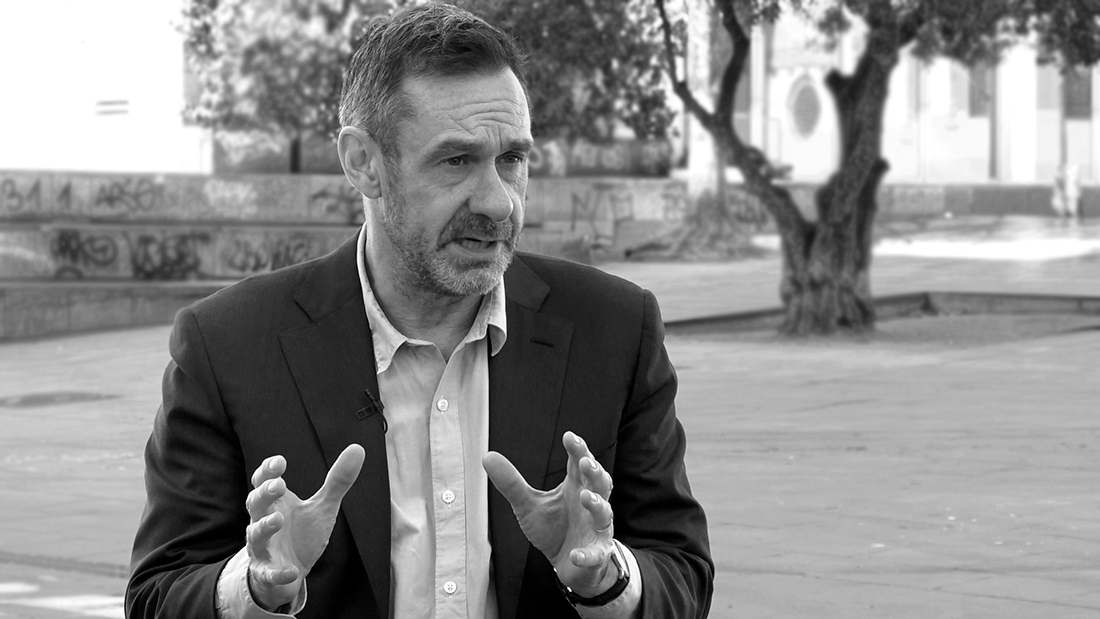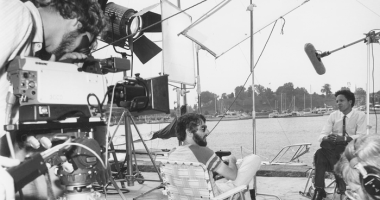Successive economic crises have led us to visualise the structural contradictions of the capitalist system. For the first time in many years, scenarios are re-emerging that until recently seemed utopian: the transition towards a society beyond capitalism, a post-work society based on automation and technological advances. We talk about all of this with Paul Mason, one of the most influential personalities of postcapitalism, taking advantage of his participation at the latest edition of Kosmopolis.
Before becoming a business journalist, Paul Mason lectured in music at Loughborough University. As a postgraduate, he specialised in the Second Viennese School of Arnold Schoenberg, but would eventually trade what the late cultural historian Carl E. Schorske referred to as that composer’s “rootless world” and “cosmic amorphousness” for the more harmonically tethered Late Romanticism of Richard Wagner.
It is tempting to see in that evolution a certain search for grounding that recalls Adorno’s search for the material life in the music that moves us. It might also foreshadow Mason’s transition from music into economic journalism. Like the Frankfurt School before him, his work hones in on the profound tensions underlying art and science, idea and practice, material and immaterial, the abstract and the real. No surprise, then, when he introduces himself as an author, journalist and “playwright”. Nor is it strange that his talk at Kosmopolis 2019 hinges on the story of Bolshevik science fiction writer Aleksandr Bogdanov and its implications for the politics of climate change.
In a recent interview at the Pati de les Dones, Mason tells me he was hired to do some research and consulting work for the film Jason Bourne. According to the contract he signed, Universal Studios owns the intellectual property he produced “for all time, throughout the universe”. “So even after this planet has exploded, and a cloud of dust is floating through the universe,” he quips, “Universal Studios still owns my work.”
“The ideology says that the market regulates itself. You don’t need a state, except to have a police force, some riot cops and the central bank.”
The absurdity of intellectual private property and the audacity of this collective belief in eternal ownership evokes the break between speculation and reality that caused the global financial crisis. The visibility of this disconnect was not just ensured by the material consequences of the crash experienced by millions of households, but also by a handful of commentators in the public sphere who, like Mason, understood that this was a crisis of an entire narrative, that new stories and new ideas would emerge in the wake of its contradictions.
“It wasn’t just that the economy blew up,” he tells me, “the ideology that underpins it no longer made sense. The ideology says that the market regulates itself. You don’t need a state, except to have a police force, some riot cops and the central bank.”
This straightforward phrasing is a large part of what has made Mason such a popular writer. It also made him one of the first mainstream journalists to offer a cohesive narrative of the financial crisis and its political consequences. Here, he suggests a relationship between financial securitisation and the securitisation of the state. By repressing protests and sending police forces to enforce evictions, governments exercised their monopoly on violence in order to guarantee the value of abstract financial products like mortgage-backed securities.
In books like Why It’s Kicking of Everywhere and Postcapitalism, Mason describes how this process obliterated predominating beliefs regarding the relationship between states and markets. Far from being in tension with one another, after 2008 markets were protected by an implicit guarantee from the state. Governments would always bail out banks. If necessary, central banks would simply print more money. Again, he stresses that this was ultimately an ideological choice in our interview. “It wasn’t a problem of the economy collapsing,” he concludes, “it was kept on life support. It’s the ideology that cannot be kept on life support.”

But even a decade after the financial crisis first hit, few would characterise our economic context as a transition beyond global capitalism. On the contrary, the economies of the Global North seem to depend even more on precarious work and real estate speculation, which have multiplied partially as a result of ongoing technological changes. Yet Mason sees seeds of change in the role of technology:
I don’t believe that the social relations of capitalism can survive the complete rollout of automation, artificial intelligence and the potential of digital networks. This technology is in revolt against private property. Karl Marx said it in the 1850s. He said that if you ever get to a situation where humanity has stood to the side of the production process, letting machines do the job, you will need for knowledge to become social.
Now, he couldn’t imagine the Internet, but it’s clearly that. Wikipedia, open-source software, the standards we rely on to run aircraft or city transport systems? We don’t need those to be privately owned. They are naturally a public good.
I wonder if there might be some hole or crack in the capitalist economic jargon where we might observe such a contradiction. Mason points to the impact of technology on the production of value, what Jeremy Rifkin and others often refer to as the “zero marginal cost” effect. Citing the Nobel Prize-winning economist Paul Romer, Mason explains that it is especially difficult to set prices for information goods because they are non-rival and cost almost nothing to reproduce. In response to this situation, governments impose an artificial scarcity by protecting intellectual property rights. “So what does that mean?” Mason asks:
What is Google? What is Facebook? What is Amazon? They are monopolies designed to prevent the price of their products from falling to zero. They are a new kind of monopoly, and the key to unlocking the future is to break them up. If there were ten Facebooks, there would be competition, and the super-profits that Facebook is receiving would collapse. The price of its product would collapse. The same goes for Google and Amazon.
In the wake of the Facebook-Cambridge Analytica revelations, the idea of breaking up the so-called FAANG monopolies is becoming increasingly salient. But popular outrage directed at Big Tech has hardly been limited to its influence on consumers, markets and political institutions. Over the last three years, unions have organised thousands of blue-collar contract workers on Silicon Valley campuses, from shuttle drivers at Apple, Tesla, Twitter, LinkedIn, eBay, Salesforce.com, Yahoo!, Cisco and Facebook, to security guards at Adobe, IBM, Cisco and Facebook, or cafeteria workers at Cisco, Intel and Facebook. The last year, in particular, has seen a spike in tech sector labour conflicts, with Google workers organising global walkouts against sexual harassment protocols, Amazon warehouse workers organising international strikes against precarious working conditions, Deliveroo riders organising for proper employment conditions and taxi drivers entering into open conflict with Uber.
“Capitalism could be replaced by a different system based on an abundance of goods produced by automated machinery.”
Concerns about Big Tech’s impact on our lives and livelihoods abound. A widely circulated 2013 study by MIT researchers CB Frey and MA Osborne famously estimated that 47% of US employment faces a high risk of automation in the coming years. While their methodology has often been criticised, conservative estimates claim automation would more likely reduce employment by about 9%. Regardless, the OECD claims that job losses on this scale would provoke disruption in local economies several times greater than that caused by the 1950s decline of the car industry in Detroit. Another way to think about it would be to imagine the job losses resulting from the 2008 financial crisis as a permanent structural feature of the Spanish economy.
As a result, the ideas in Mason’s books have started to go mainstream. In the US Democratic primaries, presidential candidate Elizabeth Warren is strongly promoting a detailed plan to break up the tech monopolies. Meanwhile, outsider candidate Andrew Yang seems to draw many of his ideas from an ideological project some radical leftists in the UK refer to as “fully automated luxury communism”. Are the profound changes Mason has been reporting on for years bringing a resurgence in utopian projects?
I think information technology is going to erode the need for work. It’s going to create pools of abundance within this century. And on that basis, it’s entirely logical to believe that capitalism, which is showing extreme signs of fatigue anyway, could be replaced by a different system based on the abundance of goods produced by automated machinery. Most work will be human-to-human work, and on top of that, most work will be done voluntarily. So we have to find a way for people to live, not connected to the salaries they receive at work.
My project is to try and eradicate the need for waged work on the planet. And the only way to do that is by automating the production of things and automating as much as we can of the production of services. This has been the Utopian project of humanity since Aristotle. Aristotle writes of some mythological tripods which could move around on their own and do work without being commanded. He says, in this amazing sentence, “If such machines ever existed, the difference between master and slave would disappear”.




Leave a comment